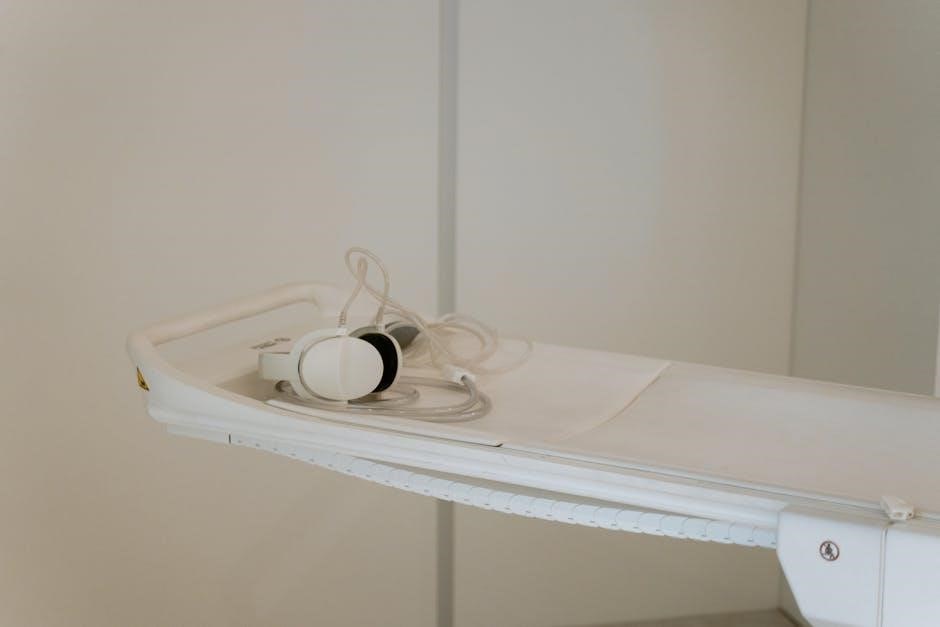
Nursing assistant practice tests are essential for CNA exam preparation, offering realistic scenarios and sample questions to enhance readiness. Printable PDFs provide offline access, aiding in confident test familiarization and skill mastery.
Overview of Certified Nursing Assistant (CNA) Certification
Certified Nursing Assistant (CNA) certification is a critical credential for healthcare professionals, validating their ability to provide quality patient care. The exam, administered by organizations like the NNAAP, assesses both clinical skills and knowledge. It typically includes a written section with multiple-choice questions and a hands-on skills evaluation. Preparation materials, such as practice test PDFs, are widely used to familiarize candidates with exam formats and content. The certification is essential for employment in healthcare settings, demonstrating competence in patient care, infection control, and ethical practices. Successful completion of the exam ensures readiness for the demands of the nursing assistant role.
Importance of Practice Tests in CNA Preparation
Importance of Practice Tests in CNA Preparation
Practice tests are crucial for CNA exam success, enabling candidates to assess their readiness and identify areas for improvement. They familiarize individuals with the exam format, question types, and time constraints, reducing anxiety. By simulating real test conditions, practice tests help build confidence and problem-solving skills. Printable PDFs offer convenient offline access, allowing candidates to review materials anytime. Regular use of practice tests enhances understanding of key topics, such as patient care and infection control, ensuring a strong foundation for the certification exam. This structured approach maximizes preparation efficiency and improves overall performance.
Structure of a Typical Nursing Assistant Practice Test
A typical nursing assistant practice test includes multiple-choice questions and clinical skills assessments, mirroring the actual exam format. Tests often contain 70-100 questions, covering topics like patient care, infection control, and medical terminology. Clinical sections may simulate tasks such as vital sign measurement and patient transfers. Time limits are set to reflect real exam conditions, helping candidates manage their pace. Answer rationales are provided to enhance learning. Printable PDF versions allow offline study, ensuring familiarity with the test structure and content, which is crucial for effective CNA preparation and confident performance on exam day.

Understanding the Nursing Assistant Exam Format
The nursing assistant exam combines written multiple-choice questions and hands-on clinical skills assessments, ensuring comprehensive evaluation of knowledge and practical abilities essential for CNA certification.
Multiple Choice Questions (MCQs) in Nursing Assistant Exams
Multiplication choice questions (MCQs) are a cornerstone of nursing assistant exams, assessing knowledge across patient care, infection control, and medical terminology. Typically, exams include 70 MCQs with rationales, designed to evaluate critical thinking and understanding of essential concepts. These questions cover topics like basic human needs, urinary incontinence causes, and clinical procedures. MCQs are timed, with a two-hour limit, ensuring candidates can manage their time effectively. Practice tests with MCQs help familiarize candidates with the exam format, identify knowledge gaps, and build confidence. They are available in printable PDFs, offering convenient offline study options to enhance preparation.
Clinical Skills Assessment in the CNA Exam
The clinical skills assessment evaluates a candidate’s ability to perform essential patient care tasks, such as measuring vital signs, transferring patients, and wound care. Practice tests, including PDF guides, provide realistic scenarios to rehearse these skills. Candidates must demonstrate competence in infection control and safety protocols during simulations. Time management is critical, as the exam includes a hands-on portion with strict timing. Printable PDFs often include step-by-step guides for clinical procedures, aiding in mastery. Effective practice ensures confidence in performing tasks accurately and efficiently, aligning with exam standards and patient care expectations.
Time Management Strategies for the Exam
Effective time management is crucial for success in the CNA exam, which typically includes 70 questions to be answered within two hours. Practice tests help candidates familiarize themselves with the exam’s pacing. Allocate approximately 1.5 minutes per question to ensure thorough reading and answering. Prioritize questions with higher confidence levels first, then revisit challenging ones. Utilize practice test PDFs to simulate exam conditions, enhancing your ability to work efficiently under pressure. Staying calm and focused is key to maintaining a steady pace and avoiding errors. Proper time allocation ensures all questions are addressed, maximizing scoring potential and reducing anxiety.

Key Topics Covered in Nursing Assistant Practice Tests
Nursing assistant practice tests cover essential patient care skills, infection control, medical terminology, and legal considerations. They also include clinical scenarios and ethical dilemmas, ensuring comprehensive exam readiness.
Patient Care Skills and Procedures
Patient care skills and procedures are fundamental in CNA practice tests, focusing on daily living activities like bathing, dressing, and feeding. Tests also cover vital signs monitoring, proper use of medical equipment, and safe transfer techniques. These questions assess the ability to maintain patient dignity and prevent complications. Additionally, practice tests simulate real-life scenarios, such as assisting with mobility and providing comfort measures. Understanding these procedures is crucial for delivering high-quality care and ensuring patient safety. These practice questions help nursing assistants master essential tasks required in clinical settings, preparing them for the demands of the job.
Infection Control and Safety Protocols
Infection control and safety protocols are critical in nursing assistant practice tests, emphasizing hand hygiene, proper use of PPE, and isolation procedures. Questions cover identifying infection risks, sanitizing equipment, and following safety guidelines to prevent the spread of pathogens. These topics ensure nursing assistants understand how to maintain a sterile environment and protect both patients and themselves. Practice tests also address emergency protocols and proper waste disposal, ensuring compliance with healthcare standards. Mastering these protocols is essential for providing safe and effective patient care in clinical settings.
Medical Terminology and Basic Anatomy
Medical terminology and basic anatomy are foundational in nursing assistant practice tests, focusing on understanding key terms, body systems, and anatomical structures. Questions assess knowledge of prefixes, suffixes, and root words, enabling effective communication in healthcare settings. Practice tests include identifying organs, their functions, and common medical conditions. This section ensures nursing assistants can accurately document patient data, comprehend medical orders, and provide informed care. Mastery of terminology and anatomy enhances patient outcomes and professional competence, making it a vital component of CNA exam preparation.
Legal and Ethical Considerations in Nursing
Legal and ethical considerations are critical in nursing practice, ensuring patient rights, confidentiality, and dignity are upheld. Nursing assistants must understand laws related to patient autonomy, informed consent, and confidentiality. Ethical dilemmas, such as end-of-life care decisions, require a strong moral compass. Practice tests include scenarios addressing these issues, helping candidates apply legal and ethical principles in real-world situations. Correct documentation and adherence to facility policies are also emphasized, ensuring compliance with regulations and maintaining professional integrity. These questions prepare nursing assistants to navigate complex situations responsibly and ethically in their daily roles.
Benefits of Using Nursing Assistant Practice Test PDFs
Nursing assistant practice test PDFs offer convenience, familiarity with exam formats, and targeted skill improvement. They help identify knowledge gaps and boost confidence through realistic question exposure.
Familiarization with Exam Format and Question Types
Nursing assistant practice test PDFs allow candidates to familiarize themselves with the exam format, including multiple-choice questions and clinical skills assessments. These resources simulate real test conditions, helping applicants understand question types, time limits, and content distribution. By practicing with realistic scenarios, individuals can reduce anxiety and improve performance. PDFs often align with standards like NNAAP, ensuring relevance and accuracy. This familiarity boosts confidence and readiness, enabling candidates to approach the actual exam with a clearer understanding of what to expect and how to manage their time effectively during the assessment.
Identification of Knowledge Gaps
Nursing assistant practice test PDFs help candidates identify knowledge gaps by assessing their understanding of key topics. These tests reveal areas where additional study is needed, such as patient care skills or infection control. By reviewing incorrect answers and their rationales, individuals can pinpoint weaknesses and focus their study efforts. This targeted approach ensures that learners address specific vulnerabilities, improving overall comprehension and preparation. Regular use of practice tests allows aspiring CNAs to refine their knowledge and build a stronger foundation for the actual exam, ensuring they are well-prepared for all aspects of the assessment.
Enhanced Test-Taking Confidence
Engaging with nursing assistant practice test PDFs significantly boosts test-taking confidence. By simulating exam conditions, these resources help candidates become familiar with question formats and timing, reducing anxiety. Regular practice builds familiarity with content, enabling individuals to approach the actual exam with assurance. The ability to review rationales and understand mistakes fosters a sense of mastery. Enhanced confidence not only improves performance but also allows candidates to tackle challenges more effectively, ensuring they feel prepared and self-assured on test day. This mindset is crucial for success in the CNA certification process.

How to Effectively Use Nursing Assistant Practice Tests
Regularly practicing with nursing assistant test PDFs helps build familiarity with exam formats and content. Review rationales, simulate exam conditions, and track progress to refine study strategies effectively.
Setting Up a Study Schedule with Practice Tests
Creating a structured study plan with nursing assistant practice tests ensures consistent preparation. Allocate specific days for reviewing PDF materials, simulating exam conditions, and assessing progress. Regularly practicing with timed tests helps build time management skills and familiarizes candidates with the exam format. Incorporate breaks to avoid burnout and maintain focus. Prioritize areas of weakness identified through practice tests to optimize learning. By adhering to a schedule, candidates can systematically approach their preparation, ensuring comprehensive coverage of all topics and boosted confidence for the actual exam.
Reviewing Rationales and Explanations
Reviewing rationales and explanations after completing nursing assistant practice tests is crucial for understanding correct answers and improving knowledge gaps. Practice test PDFs often include detailed explanations for each question, helping candidates grasp the reasoning behind the answers. This step ensures that learners not only memorize facts but also understand the logic and principles involved. By analyzing mistakes and reinforcing correct concepts, candidates can refine their problem-solving skills and apply knowledge more effectively in real exam scenarios. Regular review of explanations enhances comprehension and reduces recurring errors, leading to improved overall performance. This practice fosters a deeper understanding of nursing concepts and procedures.
Simulating Exam Conditions During Practice
Simulating exam conditions during practice is vital for building test-taking stamina and familiarity. Set a timer for the allocated exam duration and create a quiet, distraction-free environment. Use nursing assistant practice test PDFs to mimic the actual exam format, ensuring adherence to question types and time constraints. Dress in attire similar to what you’ll wear on exam day to acclimate to the experience. This method helps identify weaknesses and improves time management skills. Regularly practicing under exam-like conditions reduces anxiety and enhances confidence, allowing candidates to focus on demonstrating their knowledge effectively during the real test. This approach is key to achieving optimal performance.
Popular Sources for Nursing Assistant Practice Tests
Official CNA exam materials, online platforms, and third-party providers offer practice tests. Printable PDFs and mobile apps are convenient options for accessing realistic questions and study resources.
Official CNA Exam Preparation Materials
Official CNA exam preparation materials are designed to mirror the actual test format, ensuring authenticity. These resources, including practice tests and study guides, are developed by recognized bodies like the NNAAP and state nursing boards. They cover essential topics such as patient care, infection control, and medical terminology. Many official materials are available in printable PDF formats, allowing candidates to practice offline. Additionally, these resources often include detailed rationales and explanations to help candidates understand their mistakes. Utilizing official materials is a reliable way to gauge readiness and identify areas for improvement, enhancing overall exam performance effectively.
Online Platforms Offering Free and Paid Tests
Various online platforms provide both free and paid CNA practice tests, catering to different learning needs. Websites like Prometric and CNA Exam Preparation offer realistic test simulations, while others supply downloadable PDFs for offline use. Paid options often include detailed explanations and performance tracking, enhancing study efficiency. Free tests are ideal for initial familiarization, while paid resources offer comprehensive preparation. These platforms ensure accessibility and flexibility, allowing candidates to practice anytime, anywhere, and refine their skills effectively for the actual exam.
Third-Party Providers of CNA Practice Tests
Third-party providers offer a variety of CNA practice tests, including printable PDFs and online simulations. These resources often align with official exam standards, covering essential topics like patient care and infection control. Some platforms provide detailed rationales and progress tracking, while others focus on realistic test scenarios. They cater to different learning styles, allowing candidates to identify knowledge gaps and improve test-taking strategies. These third-party tools complement official materials, offering additional practice opportunities and enhancing overall exam readiness for aspiring nursing assistants.
Printable PDFs for Offline Study
Printable PDFs are a convenient option for nursing assistant exam preparation, allowing offline access to practice tests. These documents often include realistic questions, answer keys, and rationales, mirroring the actual exam format. PDFs enable candidates to study anywhere, without internet reliance, and can be easily shared or printed for group sessions. Many resources offer free or paid downloadable PDFs, covering essential topics like patient care and infection control. These tools are particularly useful for self-paced learning, helping candidates familiarize themselves with the exam structure and improve their test-taking skills in a flexible and accessible manner.
Strategies for Success on the Nursing Assistant Exam
Active learning techniques, utilizing flashcards, and joining study groups enhance retention and understanding. These methods, combined with practice tests, build confidence and improve problem-solving skills efficiently.
Active Learning Techniques for Retaining Information
Active learning involves engaging with material through discussions, problem-solving, and teaching others. For nursing assistant exams, techniques like group discussions and hands-on practice enhance retention. Using practice test PDFs, learners can identify gaps and reinforce understanding. Flashcards and interactive quizzes also promote active recall, strengthening memory. Teaching concepts to peers or mentors deepens comprehension. These methods ensure information is not just memorized but understood and applied, making them highly effective for exam success and real-world application in patient care.
Utilizing Flashcards for Quick Revision
Flashcards are a valuable tool for quick revision, enabling nursing assistants to memorize key terms, procedures, and concepts efficiently. They can be created from practice test PDFs, focusing on areas like patient care skills or medical terminology. Flashcards allow for active recall, enhancing retention and understanding. Portable and easy to use, they are ideal for studying on the go. Digital flashcard apps offer additional features like spaced repetition, ensuring consistent review. By incorporating flashcards into study routines, learners can rapidly reinforce knowledge gaps identified through practice tests, building confidence for exam success and clinical proficiency.
Joining Study Groups for Collaborative Learning
Joining study groups enhances collaborative learning, allowing nursing assistants to discuss practice test questions and share insights. Group discussions clarify doubts and provide diverse perspectives, improving understanding of complex topics. Printable PDFs can be reviewed collectively, enabling peer-to-peer teaching and mutual support. Study groups also foster accountability and motivation, as members encourage each other to stay on track. Collaborative learning environments simulate real-world scenarios, helping participants apply knowledge effectively. By engaging in group study, aspiring CNAs can address weaknesses, build confidence, and develop teamwork skills essential for clinical practice, while staying focused on exam success and professional growth.

Common Challenges in Nursing Assistant Practice Tests
Time constraints, complex question types, and managing test anxiety are common challenges. Practicing with realistic PDF tests helps build confidence and improves problem-solving skills effectively.
Time Pressure and Question Complexity
Time pressure and complex questions are significant challenges in nursing assistant practice tests. Many candidates struggle to complete exams within the allotted time, especially with intricate clinical scenarios. PDF practice tests help candidates familiarize themselves with timed conditions, improving their ability to manage stress and prioritize questions effectively. Additionally, complex question types, such as multiple-choice and scenario-based queries, require critical thinking and quick decision-making. Regular practice with realistic test simulations enhances speed and accuracy, ensuring candidates can tackle challenging questions confidently during the actual exam.
Managing Test Anxiety and Stress
Test anxiety and stress are common challenges for nursing assistant candidates. Practice tests, especially in PDF format, help candidates acclimate to exam conditions, reducing nervousness. Techniques like deep breathing, visualization, and positive affirmations can alleviate stress. Printable PDFs allow candidates to practice in a comfortable environment, building confidence and familiarity with the exam format. Regular practice helps candidates identify and manage triggers, ensuring they stay calm and focused during the actual test. By simulating real exam scenarios, practice tests empower candidates to approach the exam with composure and confidence, ultimately improving their performance.
Overcoming Difficult Question Types
Difficult question types on nursing assistant exams can be challenging, but practice tests, especially PDFs, help identify and master these areas. Multiple-choice questions and clinical scenario-based problems are common, requiring critical thinking. By reviewing rationales and explanations, candidates can understand their mistakes and improve problem-solving skills. Printable PDFs allow focused practice on tough topics, such as infection control or medical terminology, enhancing familiarity and confidence. Regular exposure to varied question types ensures better preparedness, enabling candidates to approach challenging questions with clarity and accuracy during the actual exam.

Final Tips for Nursing Assistant Exam Preparation
Stay updated with the latest syllabus, practice with realistic test scenarios, and seek feedback from instructors to refine your strategy and ensure comprehensive preparation for the exam.
Staying Updated with the Latest Exam Syllabus
Regularly reviewing the latest exam syllabus ensures alignment with current testing standards. Check official sources like NNAAP or state nursing boards for updates. Utilize printable PDFs and practice tests that reflect recent changes in patient care, infection control, and medical terminology. Understanding the syllabus helps focus study efforts on critical areas, avoiding surprises on exam day. Updated materials often include new question types or content, so incorporating these into your preparation is vital for success. Stay informed to align your study materials with the most recent exam requirements and improve your readiness for the certification test.
Practicing with Realistic Test Scenarios
Engaging with realistic test scenarios in nursing assistant practice tests mimics actual exam conditions, helping candidates build confidence. Printable PDFs often include lifelike questions and clinical simulations, such as patient care dilemmas or emergency protocols. These scenarios allow learners to apply theoretical knowledge to practical situations, enhancing problem-solving skills. Regularly practicing with realistic test scenarios not only familiarizes candidates with the exam format but also improves their ability to think critically under time constraints. This approach ensures that aspiring CNAs are well-prepared to handle the challenges of the actual certification exam effectively.
Seeking Feedback from Instructors or Mentors
Seeking feedback from instructors or mentors is a crucial step in CNA exam preparation. After completing practice tests, discussing results with experienced professionals provides personalized insights. Instructors can identify knowledge gaps and offer targeted guidance, ensuring a focused study approach. Additionally, mentors can clarify rationales behind correct answers, helping candidates understand complex concepts. This collaborative learning process not only improves test-taking skills but also builds confidence. Regular feedback sessions ensure continuous improvement, making candidates better prepared for the challenges of the nursing assistant exam and their future roles in healthcare.
Nursing assistant practice tests are vital for CNA exam success, offering confidence, exam familiarity, and skill mastery. Utilize PDF resources effectively to achieve certification and excel in healthcare roles.
Summarizing the Importance of Practice Tests
Practice tests are crucial for CNA exam preparation, offering realistic question formats and scenarios. They help identify knowledge gaps, improve time management, and boost confidence. PDF resources provide offline access, enabling candidates to familiarize themselves with exam styles and master essential skills. Regular practice enhances understanding and retention of key topics, ensuring readiness for the certification test. By simulating actual exam conditions, practice tests empower aspiring nursing assistants to approach the exam with confidence and competence. They are an indispensable tool for achieving success in the CNA certification process.
Encouraging Continuous Learning and Improvement
Nursing assistant practice tests foster continuous learning by identifying knowledge gaps and strengthening weak areas. Regular use of PDF resources helps track progress and refine skills. These tools encourage candidates to revisit challenging topics, ensuring a deeper understanding of essential concepts. By simulating real exam conditions, practice tests build confidence and readiness. They also promote active learning, motivating individuals to stay updated with the latest syllabus and industry standards. Continuous improvement through practice tests is key to excelling in the CNA certification and delivering quality patient care as a nursing assistant.




